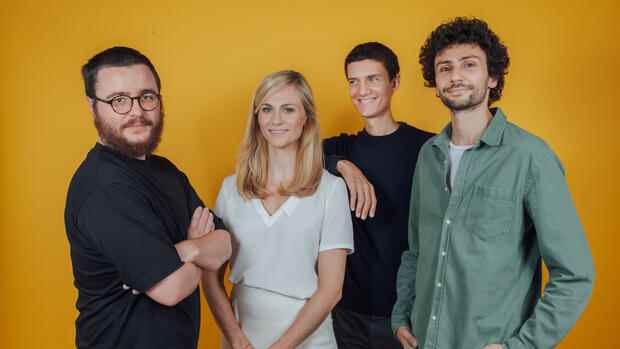The team led by Nicolas Morin-Forest (2nd from right) is completely reinventing a French specialty.
(Photo: Cyril Marcilhacy)
Berlin For the Parisian company Gourmey, food from the laboratory is not a vision of the future, but a business model. And their laboratory copy may cause less indignation than the original: the start-up produces in-vitro foie gras. Gourmey wants to give the French delicacy, which has fallen into disrepute for animal welfare reasons, a new chance and help foie gras to find its way back into the star kitchen.
The Berlin-based venture capitalist Earlybird supports the project and is leading an A round of financing worth 48 million euros. Looking at the previous trends in the food industry with plant-based start-ups such as Oatly and the mini-greenhouse provider Infarm, Earlybird partner Christian Nagel says: “We see another wave rolling in that could have an even greater impact because it tastes better does not represent a compromise. It is a real replacement for traditional meat with high quality.” For Earlybird, it is the first investment in France since opening the office there.
Gourmey was founded in 2019 by former L’Oreal manager Nicolas Morin-Forest. “Our mission is to reinvent meat for the next uncompromising and conscious generation,” he says. Gourmey grows the foie gras from a fertilized duck egg and its stem cells, which, fed with nutrients, multiply accordingly.
“You don’t know whether it’s an original or not,” says Nagel about the taste. There are no flavor enhancers like in plant-based meat substitutes.
Top jobs of the day
Find the best jobs now and
be notified by email.
Unlike Gourmey’s foie gras or similar laboratory products, the meat-free alternatives have long since found their way onto supermarket shelves. Providers such as Beyond Meat or Impossible Foods have risen to become large companies.
>> Read more about it The food revolutionaries – A trip around the world to the innovations in the food industry
Gourmey, on the other hand, is still waiting for approval and is not yet allowed to sell its artificial meat. You work hand in hand with the authorities to get the green light as quickly as possible, says Morin-Forest. Ultimately, it is planned to market the in vitro goose liver in Singapore, the USA, Great Britain and the European Union.
60 percent of Germans would try artificial meat
Singapore became the first country in the world to allow cultured meat at the end of 2020. Morin-Forest has also had an eye on Germany. The Gourmey founder cites a study according to which around 60 percent of the population are willing to try artificial meat. Market researchers from Maximize Market Research estimate that the market for cultured meat will grow from just under $7 billion last year to almost $23 billion in 2029.
While Gourmey has so far focused on foie gras, Berkeley-based Upside Foods is using lab-grown poultry and Dutch foodtech company Mosa Meat is using artificial beef. All suppliers point out that the production consumes significantly fewer resources than conventional meat production.
>> Read also: Bioreactors from Italy – How Solaris is involved in the artificial meat business
According to Morin-Forest, it has already convinced various French and international Michelin chefs, restaurants and retailers of its foie gras. So far, however, Gourmey has not been able to produce large quantities. The freshly collected money, which comes alongside Earlybird from Keen Venture Partners, Instacart boss Fidji Simo and existing investors such as Heartcore Capital and Point Nine Capital, should now remedy the situation. Morin-Forest wants to open a factory and a research laboratory in Paris and hire more experts.
The factory should be up and running in two years at the latest. “I can imagine that laboratory meat will reach the mass market in 20 to 25 years with a global market share of more than ten percent,” predicted Rainer Münch from the strategy consultancy Oliver Wyman almost a year ago. According to Nagel, good business could already be done with the sale of in-vitro goose liver: “The market for this is two to three billion euros.”
However, Gourmey does not want to leave it at that. Work is underway to expand the range to include poultry and other products. Nagel is certain that Gourmey will ultimately be able to offer meat substitutes for the mass market. “We want to invest in themes that can achieve that, not luxury offerings.”
More: Europe can lead the food revolution
